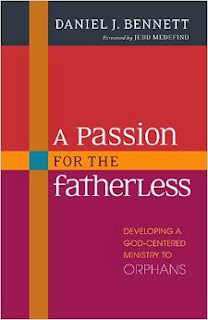conrade
TITLE: A Passion for the Fatherless: Developing a God-Centered Ministry to Orphans
AUTHOR: Daniel J. Bennett
PUBLISHER: Grand Rapids, MI: Kregel Academic, 2014, (240 pages).
Experts estimate the number of orphans globally stands at 163 million. In the United States alone, there are 425,000 of which 115,000 are waiting to be adopted. We may shudder at the numbers or be horrified at the huge quantity of fatherless. What about our compassion? Is it not God's will for us to care for the poor, the weak, the vulnerable, widows and orphans? Bennett believes that it is not only what God wanted the Church to do, it is also a very powerful "apologetic" when believers stand together to support the fatherless. Whether it is fostering, adopting, mentoring, or simply supporting, the transformation can go much more. Not only will orphans be reached and cared for, the ones who reached out will also be transformed.
Daniel J. Bennett is Senior Pastor of Bethany Community Church in central Illinois whose passion for orphans accelerated after his stint as a Family Pastor in 2005. He has adopted a child too. He notes how people caring for foster children are able to open up conversations about God as well. He describes his convictions as follows.
"My compassion for orphans flow from the fact that I know God and know that he passionately cares for the fatherless. I love orphans because I love God. If I did not have this theological understanding, my passion for orphans would be commendable but ultimately worthless." (19)






